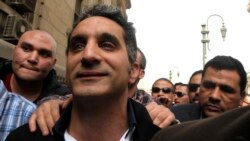The United States is concerned over threats to freedom of expression in Egypt. On March 31st, Egyptian authorities released prominent Egyptian television satirist Bassem Youssef after nearly five hours of interrogation, after charging him with denigrating Islam and insulting Egyptian President Mohamed Morsi.
The interrogation of Mr. Youssef followed recent orders by Egypt’s public prosecutor for the arrest of five opposition political activists accused of using social media to incite violence against the Muslim Brotherhood. The New York Times reported that a search of the online comments by several defendants found no messages urging others to violence.
U.S. State Department spokesperson Victoria Nuland commented on the detention of Bassem Youssef and on the issuing of arrest warrants for the five other political activists. She said such cases are “evidence of a disturbing trend of growing restriction on the freedom of expression:”
“We have concerns that freedom of expression is being stifled. This is something that came up when Secretary [of State John] Kerry was in Egypt. He raised human rights concerns, including freedom of the press, with President Morsi, and we will continue to raise these concerns.”
Ms. Nuland noted that the government of Egypt has moved quickly to investigate cases like Mr. Youssef’s, “while it has been slow or inadequate in investigating attacks on demonstrators outside of the presidential palace in December 2012 and other cases of . . . police brutality. . . There does not seem to be,” she said, “an even-handed application of justice.”
The interrogation of Mr. Youssef followed recent orders by Egypt’s public prosecutor for the arrest of five opposition political activists accused of using social media to incite violence against the Muslim Brotherhood. The New York Times reported that a search of the online comments by several defendants found no messages urging others to violence.
U.S. State Department spokesperson Victoria Nuland commented on the detention of Bassem Youssef and on the issuing of arrest warrants for the five other political activists. She said such cases are “evidence of a disturbing trend of growing restriction on the freedom of expression:”
“We have concerns that freedom of expression is being stifled. This is something that came up when Secretary [of State John] Kerry was in Egypt. He raised human rights concerns, including freedom of the press, with President Morsi, and we will continue to raise these concerns.”
Ms. Nuland noted that the government of Egypt has moved quickly to investigate cases like Mr. Youssef’s, “while it has been slow or inadequate in investigating attacks on demonstrators outside of the presidential palace in December 2012 and other cases of . . . police brutality. . . There does not seem to be,” she said, “an even-handed application of justice.”






